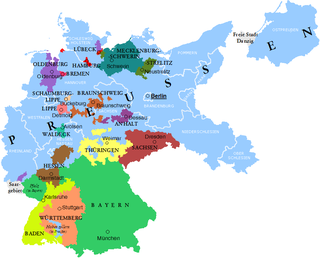Related Research Articles

This article is concerned with the elections to the Landtag of Bavaria in years of 1919–1933, the period known as the Weimar Republic.
The 1924 Bavarian state election was held on 6 April and 4 May 1924 to elect the 129 members of the Landtag of Bavaria.
The 1927 Mecklenburg-Schwerin state election was held on 22 May 1927, with re-elections being held on 11 December 1927 in Grambow-Wendischhof and Sietow, to elect the 52 members of the Landtag of the Free State of Mecklenburg-Schwerin.
The 1918 Mecklenburg-Strelitz state election was held on 15 December 1918 to elect the 42 members of the constituent assembly of the Free State of Mecklenburg-Strelitz.
The 1919Mecklenburg-Strelitz state election was held on 30 March 1919 to elect the 35 members of the Landtag of the Free State of Mecklenburg-Strelitz.
The 1920 Mecklenburg-Strelitz state election was held on 16 May 1920 to elect the 36 members of the Landtag of the Free State of Mecklenburg-Strelitz.
The 1923 Mecklenburg-Strelitz state election was held on 8 July 1923 to elect the 35 members of the Landtag of the Free State of Mecklenburg-Strelitz.
The 1927 Mecklenburg-Strelitz state election was held on 3 July 1927 to elect the 35 members of the Landtag of the Free State of Mecklenburg-Strelitz.
The 1928 Mecklenburg-Strelitz state election was held on 29 January 1928 to elect the 35 members of the Landtag of the Free State of Mecklenburg-Strelitz.
The 1932 Mecklenburg-Strelitz state election was held on 13 March 1932 to elect the 35 members of the Landtag of the Free State of Mecklenburg-Strelitz.
The 1919 Oldenburg state election was held on 23 February 1919 to elect the 48 members of the constituent assembly of the Free State of Oldenburg. The election was held in Birkenfeld on 9 March.
The 1920 Oldenburg state election was held on 6 June 1920 to elect the 48 members of the Landtag of the Free State of Oldenburg.
The 1928 Oldenburg state election was held on 20 May 1928 to elect the 48 members of the Landtag of the Free State of Oldenburg.
The 1931 Oldenburg state election was held on 17 May 1931 to elect the 48 members of the Landtag of the Free State of Oldenburg.
The 1932 Oldenburg state election was held on 29 May 1932 to elect the 46 members of the Landtag of the Free State of Oldenburg.

Landtag elections in the Free State of Thuringia (Freistaat Thüringen) during the Weimar Republic were held at irregular intervals between 1920 and 1932. Results with regard to the total vote, the percentage of the vote won and the number of seats allocated to each party are presented in the tables below. On 31 March 1933, the sitting Landtag was dissolved by the Nazi-controlled central government and reconstituted to reflect the distribution of seats in the national Reichstag. The Landtag subsequently was formally abolished as a result of the "Law for the Reconstruction of the Reich" of 30 January 1934 which replaced the German federal system with a unitary state.

Landtag elections in the Free State of Mecklenburg-Schwerin (Freistaat Mecklenburg-Schwerin) during the Weimar Republic were held at irregular intervals between 1919 and 1932. Results with regard to the total vote, the percentage of the vote won and the number of seats allocated to each party are presented in the tables below. On 31 March 1933, the sitting Landtag was dissolved by the Nazi-controlled central government and reconstituted to reflect the distribution of seats in the national Reichstag. The Landtag subsequently was formally abolished as a result of the "Law for the Reconstruction of the Reich" of 30 January 1934 which replaced the German federal system with a unitary state.
Landtag elections in the Free State of Mecklenburg-Strelitz (Freistaat Mecklenburg-Strelitz) during the Weimar Republic were held at irregular intervals between 1918 and 1932. Results with regard to the total vote, the percentage of the vote won and the number of seats allocated to each party are presented in the tables below. On 31 March 1933, the sitting Landtag was dissolved by the Nazi-controlled central government and reconstituted to reflect the distribution of seats in the national Reichstag. The Landtag subsequently was formally abolished as a result of the "Law for the Reconstruction of the Reich" of 30 January 1934 which replaced the German federal system with a unitary state.
The 1925 Oldenburg state election was held on 24 May 1925 to elect the 40 members of the Landtag of the Free State of Oldenburg.

Landtag elections in the Free State of Oldenburg (Freistaat Oldenburg) during the Weimar Republic were held at Irregular intervals between 1919 and 1932. Results with regard to the total vote, the percentage of the vote won and the number of seats allocated to each party are presented in the tables below. On 31 March 1933, the sitting Landtag was dissolved by the Nazi-controlled central government and reconstituted to reflect the distribution of seats in the national Reichstag. The Landtag subsequently was formally abolished as a result of the "Law for the Reconstruction of the Reich" of 30 January 1934 which replaced the German federal system with a unitary state.
References
- 1 2 Gonschior, Andreas. "Der Freistaat Oldenburg Landtagswahl 1923". Wahlen in der Weimarer Republik. Archived from the original on 2001-05-25. Retrieved 20 May 2021.
- ↑ Schröder, Valentin. "Landtagswahlen Freistaat Oldenburg". Wahlen in der Deutschland. Archived from the original on 2016-03-24. Retrieved 19 May 2021.